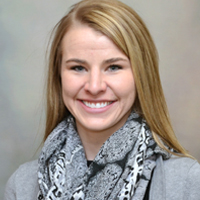
Recent Blogs
-

-
 Speaking of HealthBeyond words: ASL interpreter creates bridge between deaf patients, healthcareApril 15, 2024
Speaking of HealthBeyond words: ASL interpreter creates bridge between deaf patients, healthcareApril 15, 2024 -

Speech-Language Therapy Services & Treatments
Do you or your child have communication, swallowing or voice difficulties? Our speech-language pathologists help patients of all ages develop and maintain their ability to speak more clearly, understand and express thoughts and feelings, and eat and swallow safely.
Find out more about our speech-language services:
- Conditions and consultations
- Diagnosis and treatments
- Speech-language Therapy specialists
- Referrals
- FAQ
- Speech-Language Therapy locations near you
- Speech-Language Therapy providers near you
Conditions and consultations
Our speech-language pathologists care for children and adults.
Conditions treated include:
- Aphasia
- Apraxia
- Articulation problems
- Augmentative and alternative communication systems
- Cleft palate
- Cognition
- Communication problems associated with autism, cerebral palsy, emotional concerns, head injury, hearing loss and pervasive developmental disorders
- Delayed/disordered speech and language
- Difficulty swallowing, also known as dysphagia
- Dysarthria
- Executive function, such as difficulty planning and carrying out tasks
- Laryngitis or hoarse voice
- Laryngectomy
- Oral, oropharyngeal (mouth and pharynx) or nasopharyngeal (nose or nasal cavity) cancer complications
- Problem-solving and reasoning
- Stroke-related deficits
- Stuttering
- Traumatic brain injury
- Voice disorders
Diagnosis and treatments
Our speech-language pathologists see patients in the outpatient setting.
Treatments provided include:
- Cancer rehabilitation
- Electric stimulation therapy
- Fiber-optic endoscopic swallowing evaluation
- Evidence-based therapy for neurological conditions
- Neuromotor clinic services
- Parkinson's disease therapy to improve voice communication and quality of life
- Pediatric speech therapy
- Swallowing difficulties and video swallowing studies
- Videostroboscopy for voice assessment
Speech-Language Therapy specialists
Speech-language pathologists are licensed practitioners who are experts in assessing and treating communication disorders.
Additional care and therapies may be provided by:
- Gastroenterology & Hepatology
- Neurology
- Occupational Therapy and Physical Therapy
- Otolaryngology (ENT)/Head & Neck Surgery
- Pediatric & Adolescent Medicine
Find a speech-language therapist near you.
Referrals
A referral is required, and your primary care provider can help refer you. Be sure to check your insurance plan to see if speech therapy services are covered. Call the appointment number of your preferred Speech-Language Therapy location to learn more.
FAQ
What should I expect during my first appointment, and what should I bring?
During your initial visit, you will discuss your goals for therapy, and the speech-language pathologist will evaluate your speech-language concerns. After the evaluation, the pathologist will diagnose the concern and develop an individualized treatment plan with you. Your therapy team will provide education, treatment, intervention, management and counseling for you and your family.
For your first appointment, bring any imaging or medical records from non-Mayo Clinic Health System facilities. Complete a medical records release form (PDF) to authorize the transfer of health records from another healthcare facility to us. Visit our Medical Record Forms page for this form and other forms in multiple languages.
How can you help my child with his speech development?
Speech-language pathologists help infants, children and families reach maximum function while at home, school and in the community. Speech therapy can help correct speech sound errors, expand vocabulary, improve grammar, listening and social interaction skills, and help with swallowing and feeding.
During your first visit, the pathologist will meet with you to discuss your concerns and observe your child participating in a variety of activities to examine your child's listening, speaking and communication skills. After the evaluation, the speech-language pathologist will determine if services are recommended and develop a treatment and activities plan.
Our pathologists treat pediatric speech disorders, which are caused by several conditions, including developmental delays, autism spectrum disorders, fluency and stuttering, literacy issues, neurological disorders, auditory processing disorders and more.
What are my payment options, and do you offer financial assistance?
Visit the billing page of your preferred location for information on insurance, billing and payments.
We serve patients in difficult financial circumstances and offer financial assistance to those who have an established need to receive medically necessary services. Learn more about financial assistance options.
Can you provide a second opinion?
Yes — call the appointment number at your preferred Speech-Language Therapy location. See What should I expect during my first appointment? for tips on how to prepare.
Do you have an after-hours number in case of emergency?
Always call 911 in case of an emergency. For after-hours help with other issues, get virtual care 24/7 through the Primary Care On Demand app or review our convenient care options.


